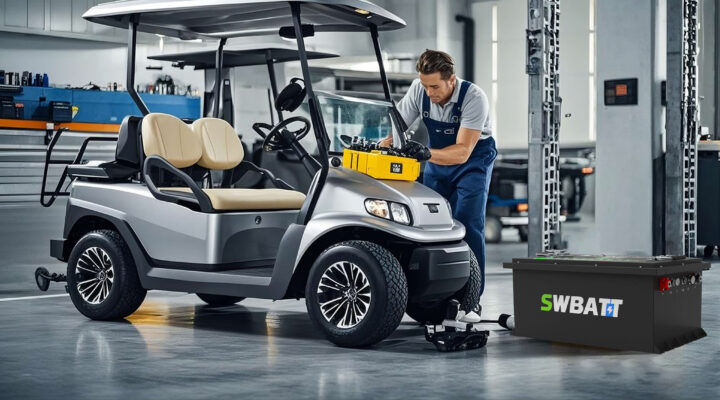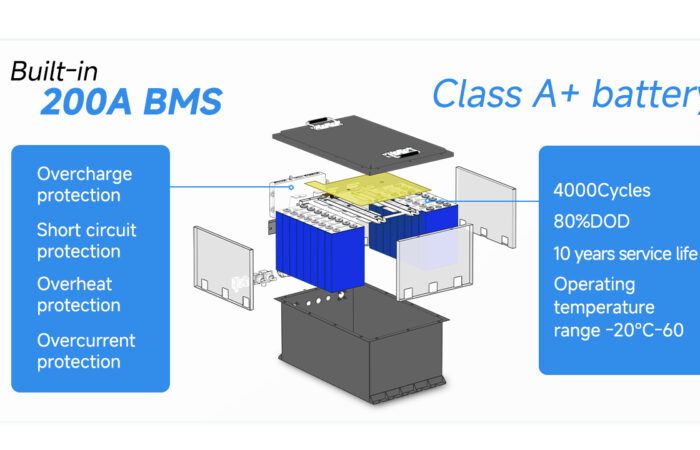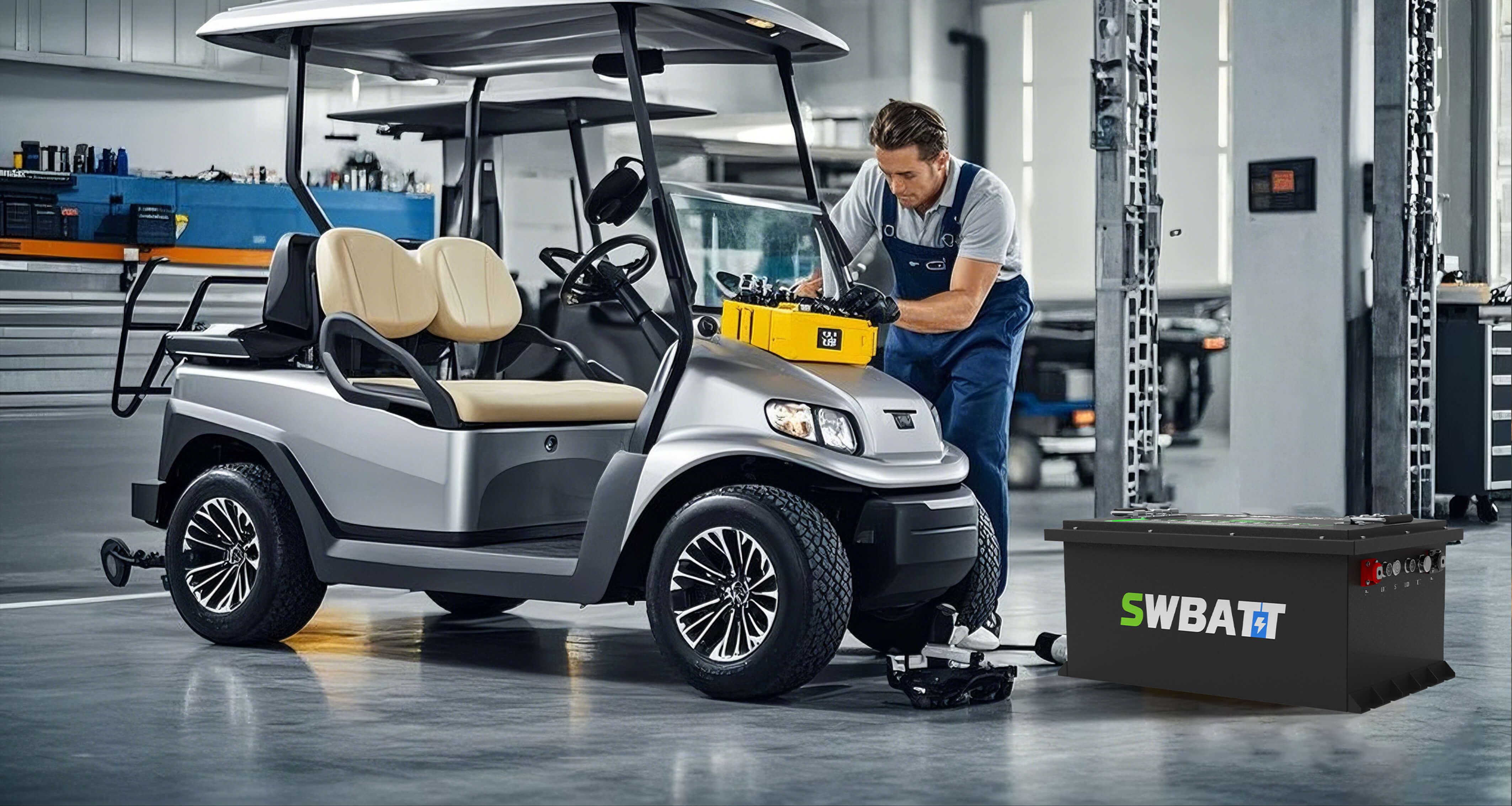Introduction
Lithium-ion batteries have become the superior power solution in the dynamic landscape of golf carts. Offering unparalleled performance, extended lifespan, and a commitment to sustainability, they outshine traditional lead-acid batteries. This comprehensive guide is meticulously crafted for golf cart brand dealers and lithium battery packs distributors, equipping you with the essential insights to make well-informed decisions when procuring the best 48V lithium battery for golf carts.
Why Lithium-Ion Batteries Are the Best Choice for Golf Carts
Table of Contents
ToggleBefore we delve into specific product recommendations, let’s underscore the key advantages that lithium-ion batteries bring to the table:
- Extended lifespan: Lithium batteries typically last 2-3 times longer than their lead-acid counterparts, significantly reducing the total cost of ownership over time.
- Lightweight: Lithium batteries are notably lighter, enhancing golf cart efficiency and an extended range.
- Fast charging: Lithium batteries facilitate rapid charging, minimizing downtime and maximizing the operational readiness of your fleet.
- Consistent power: Lithium batteries deliver a steady power output throughout their discharge cycle, ensuring consistent and optimal performance on the course.
- Eco-friendly: Lithium batteries champion environmental responsibility with a lower carbon footprint, aligning with the growing emphasis on sustainable practices.

| Feature | Lithium Batteries | Lead-Acid Batteries |
| Lifespan | 5-10 years longer | 1-2 years |
| Charging Time | 1-3 hours | 8-12hours |
| Maintenance | Maintenance-free | Requires regular water refills |
| Weight | Weight reduction of about 50 per cent | Heavy and bulky |
| Performance | Continuous and stable power | Power fades as battery discharges |
| environmental | New clean energy | Heavy metal toxins, heavy pollution |
This comparison table vividly illustrates the compelling advantages of lithium-ion batteries for golf carts, particularly in lifespan, weight, charging efficiency, and overall performance metrics.
Step 1: Define Your Needs
- Golf cart type: Identify the specific models that will receive your lithium battery upgrade.
- Usage patterns: Analyze the typical usage patterns, encompassing frequency of use, terrain characteristics, and daily mileage demands.
- Performance requirements: Establish your golf cart fleet’s desired range, speed capabilities, and acceleration parameters.
Step 2: Evaluate Battery Specifications
- The amp-hour (Ah) rating indicates the battery’s capacity and range. Higher Ah ratings translate to longer ranges on a single charge.
- Voltage: Ensure the chosen battery aligns seamlessly with your golf cart’s voltage requirements, typically 48V for most models.
- Cycle life: This parameter reflects the number of charge-discharge cycles the battery can endure before its capacity diminishes.
- Depth of discharge (DOD): This denotes the percentage of the battery’s capacity that can be safely utilized before recharging is necessary.
- Charging time: Factor in the charging time required to meet your operational needs and minimize downtime.
Step 3: Compare Battery Brands and Models
Conduct thorough research and comparison across various lithium battery brands and models, considering the following pivotal factors:
- Reputation and reliability: Opt for reputable brands with a proven track record of delivering high-quality and dependable products.
- Warranty: Seek out batteries with comprehensive warranties, providing assurance and protection for your investment.
- Safety features: Prioritize batteries that are equipped with essential safety features, such as overcharge protection, over-discharge protection, and temperature monitoring capabilities.
- Certifications: Verify that the batteries hold relevant certifications, such as UL or CE, attesting to their adherence to industry standards.
Step 4: Consider Additional Factors
- Battery Management System (BMS): A high-quality BMS is indispensable for ensuring the safe and efficient operation of the battery, optimizing its performance and longevity.
- Compatibility: Confirm that the chosen battery is fully compatible with your golf cart’s charging system and physical dimensions for seamless integration.
- Cost: Balance the initial cost of the lithium battery with its long-term benefits, including reduced maintenance and extended lifespan.
While this guide primarily focuses on 48V lithium batteries, it’s worth noting that 36V lithium batteries are also available for specific golf cart models. The selection process remains broadly similar, with voltage and capacity considerations adjustments.
Best 48 Volt Golf Cart Batteries: Exploring Options
Lithium-ion technology is the frontrunner when seeking the best 48-volt golf cart batteries. However, exploring various brands and models within this category is crucial to identifying the perfect fit for your needs.
Best 48 Volt Lithium Battery: Making Informed Decisions
Choosing the best 48-volt lithium battery requires a holistic evaluation of performance, longevity, safety, and cost. This guide serves as your compass in navigating this decision-making journey.
Best Lithium Golf Cart Batteries: A Comprehensive View
The realm of best lithium golf cart batteries encompasses a spectrum of options tailored to different golf cart models and usage scenarios. By understanding the nuances of each offering, you can curate the ideal power solution for your fleet.

For those specifically seeking the best lithium battery for Club Car Precedent models, it’s essential to ensure compatibility with the cart’s unique design and electrical system. Consulting with Club Car specialists and lithium battery providers can streamline this process.
Best 48 Volt Lithium Golf Cart Batteries: Prioritizing Quality
When investing in the best 48-volt lithium golf cart batteries, prioritize quality and reliability to ensure long-term performance and customer satisfaction.
Understanding Lithium Battery Capacity and Charging Time
The relationship between a lithium battery’s capacity (measured in Amp-hours or Ah) and its charging time is crucial for optimizing golf cart operations. Generally, a higher Ah rating indicates a larger capacity, allowing for more extended usage between charges. However, it also means that the battery will take longer to charge.
The charging time is influenced by several factors, including the battery’s Ah rating, the charger’s output current (measured in Amps), and the battery’s state of charge. A higher charger output current can reduce charging time, but it’s essential to ensure that the charger is compatible with the battery to avoid damage.
Golf Lithium Battery Packs: Series vs. Parallel Connections
Golf cart lithium battery packs often combine series and parallel connections to achieve the desired voltage and capacity.
- Series Connection: When batteries are connected in series, their voltages increase. For example, connecting two 24V batteries in series results in a 48V system.
- Parallel Connection: When batteries are connected in parallel, their capacities increase. Connecting two 100Ah batteries in parallel results in a 200Ah system.
Manufacturers can create battery packs that meet golf cart models’ specific voltage and capacity requirements by strategically combining series and parallel connections.
Product Craftsmanship: Meeting Stringent Standards
The quality and craftsmanship of lithium battery packs are paramount for ensuring safety, reliability, and longevity. Here are some key aspects to consider:
- Cell Selection: Reputable manufacturers use high-quality lithium-ion cells from trusted suppliers. These cells undergo rigorous testing to ensure consistent performance and safety.
- Battery Management System (BMS): A sophisticated BMS is crucial for monitoring and controlling various aspects of the battery pack, including voltage, current, temperature, and state of charge. It protects the battery from overcharging, over-discharging, and other potentially hazardous conditions.
- Assembly and Construction: The battery pack’s assembly and construction should adhere to strict quality standards. This includes proper wiring, secure connections, and robust housing to protect the cells and BMS.
- Testing and Certification: Reputable manufacturers conduct thorough testing to ensure their battery packs meet industry standards and safety regulations. Certifications such as UL and CE provide further assurance of quality and safety.
Actual Case Analysis
A golf course operator was looking to upgrade their fleet of 50 golf carts to lithium-ion batteries. After evaluating several options, they chose a 48V 150Ah lithium battery with a 3000+ cycle life and a 5-year warranty. This decision resulted in:
- Increased range, allowing golfers to complete their rounds without needing to recharge.
- Reduced downtime, as the batteries could be charged quickly during breaks.
- Lower maintenance costs, as lithium batteries, require minimal upkeep.
- Improved customer satisfaction due to the enhanced golf cart performance

Conclusion
Selecting the best 48V lithium battery for golf carts is a crucial decision for golf cart brand dealers and lithium battery distributors. By following this guide and conducting thorough research, you can make informed choices that will benefit your business and customers.
FAQS
- Q: What is the average lifespan of a 48V lithium battery for a golf cart?
- A: Typically, a high-quality lithium battery will last for 3000-4000 cycles or 5-7 years, depending on usage and maintenance.
- Q: How much does a 48V lithium battery for a golf cart cost?
- A: The cost varies depending on the battery’s capacity, features, and brand. Expect to pay anywhere from $7000 to $3000 or more.
- Q: Are lithium batteries safe for golf carts?
- A: Yes, lithium batteries are safe when used correctly. Look for batteries with built-in safety features and certifications.
- Q: How do I maintain a 48V lithium battery for a golf cart?
- A: Lithium batteries require minimal maintenance. Avoid extreme temperatures, store the battery at a partial charge when unused, and follow the manufacturer’s recommendations.




